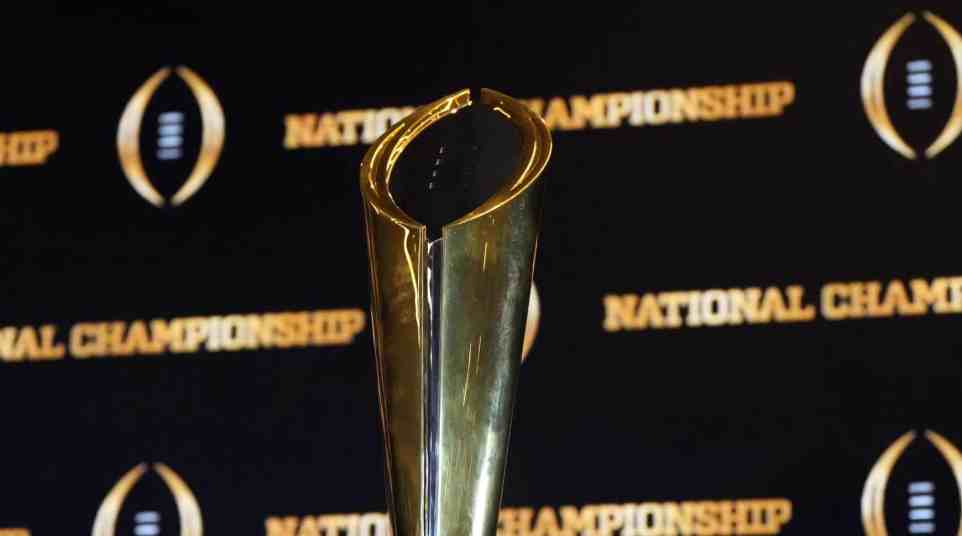
Hayes: 12-team Playoff bracket will be a gambler's dream, but there are real concerns, too
MIRAMAR BEACH, Fla. — Before we dive into this argument with no answers, let’s first navigate the duplicity of it all.
College sports is suddenly interested again in the boogeyman that is gambling.
“There must be zero tolerance for activity that puts into question the integrity of competition,” SEC commissioner Greg Sankey said this week at the SEC spring meetings.
Now let me reintroduce to you the NCAA basketball tournament. Or more specifically, the bracket.
College basketball always has been a postseason sport. Scant television numbers during the regular season increase 10-fold or more during the tournament.
That’s not because of competition, it’s because of gambling.
It’s the bracket, and everything that goes with it — including a multi-billion dollar media rights contract. CBS isn’t signing 9-figure checks for college basketball.
It’s paying billions for a 4-week tournament built on the bracket — and all of those bracket pools that make ratings skyrocket. Think about this: Only the Super Bowl ($16 billion wagered in 2023) is a bigger event for sports gambling than the NCAA Tournament ($15.5 billion wagered in 2023).
Now let’s return to the bracket, the simple graphic with so much staying power.
When college football announced in September of 2022 that it would move to a 12-team Playoff, it did so by announcing it would not reseed teams during the tournament. By comparison, the NFL reseeds its Playoffs after each round — expressly to give home field and games against lower seeded teams for better seeds.
The Playoff instead chose to continue with the bracket brand that had become so popular with most other NCAA championships.
It’s not a stretch to think gambling behavior on the Playoff (bracket pools) will mimic the NCAA Tournament bracket pools — in a significantly larger sport and environment — despite the decreased games (67 basketball games, 11 football games).
Like it or not — fair or not — the bracket is a connection to gambling and what will be the biggest college sporting event of the year.
“I get where you’re coming from,” Alabama athletic director Greg Byrne told SDS. “Maybe that’s something we have to talk about.”
They’ve tried everything else this week, and the uneasy reality is gambling and college sports is ultimately controlled by the human condition. If someone connected to the conference — player, coach, staffer — wants to gamble on a sport where the NCAA sponsors a championship, they will.
There are numerous ugly roads and vulnerabilities where this could turn, and none are manageable. What’s to prevent a player or coach or staffer from gambling and losing big on horses or NASCAR or F1 races — then using inside information on their NCAA sport to make up for losses?
In an effort to get a better handle on the situation, the SEC had multiple presentations this week from U.S. Integrity, a Las Vegas-based company that monitors gambling improprieties worldwide.
Coaches and administrators also debated a weekly injury report, which in theory would help eliminate insider information that could force betting line fluctuations. Social media posts — depending on sources and reliability — could turn viral and affect millions in wagers.
They’ve also talked at length about giving players clear and unambiguous rules: players (and coaches) are prohibited from betting on any sport where the NCAA sponsors a championship. The problem, though, are the ramifications for such acts.
Every incident is unique, and most every one will be dealt with differently.
NCAA rules state if players accept or place a bet on any college or professional team other than their own, they will automatically be suspended for a minimum of of 1 year and be charged a season of competition.
But is that punishment enough to deter the possibility of gambling from any member of a college team? If the money is there, and the only ramification (again, in theory) is the loss of 1 season, does risk vs. reward come into play?
When asked if he could further strengthen penalties within the SEC — including permanent expulsion from SEC competition on 1st offense — to deter gambling, Sankey said every case if different, and “When all you have is a hammer, everything is a nail.”
Last month, in the middle of a gambling investigation of a his now fired baseball coach, Byrne held a staff meeting to double down on the dangers of gambling. He told his staff he refuses to even participate in an NCAA bracket pool “because of the optics.”
It’s the bracket, everyone. And it will only be more engrained in college football once the 12-team Playoff arrives in 2024.
Not because of competition. Because of gambling.
